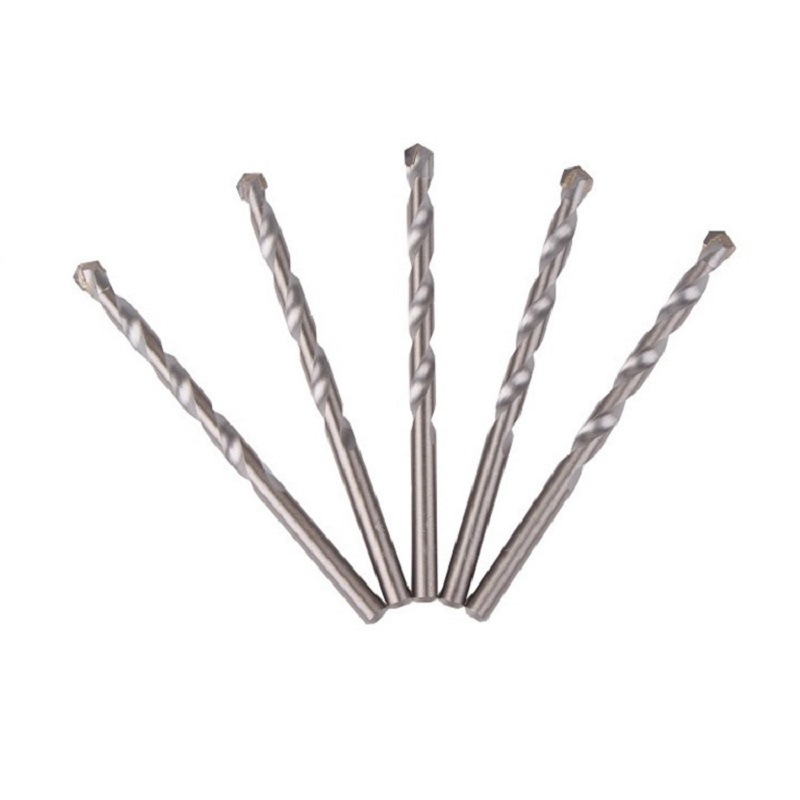Masonry Drill Bits: Engineering Precision for Stone, Brick, and Concrete
Anatomy of a High-Performance Masonry Drill Bit
Every masonry bit is a marvel of engineering designed to withstand immense friction and impact forces:
- Carbide-Tipped Cutting Head: The business end features tungsten carbide tips (grades like YG8C), brazed to the steel body using high-temperature processes. This ultra-hard material (HRC 55+) crushes aggregate and withstands abrasion that would instantly dull HSS bits .
- Optimized Flute Design: Double-spiral flutes milled from Cr40 alloy steel efficiently channel dust debris away from the hole. This prevents bit binding and overheating while increasing penetration speed by up to 40% compared to single-flute designs .
- Precision Geometry: A 130° (±2°) tip angle provides the ideal balance between aggressive cutting and structural integrity, while crosshead or four-cutter configurations distribute load evenly across the tip for extended life .
Breakthrough Technologies Driving Performance
Advanced Materials & Coatings
Premium bits leverage chromium/nickel coatings applied via electrochemical deposition. This reduces friction by up to 30%, prevents corrosion, and extends service life even when drilling abrasive sandstone or silica-rich concrete 1. The substrate uses high-manganese steel for exceptional fatigue resistance under impact loads .
ISO-Standardized Precision
Leading manufacturers adhere to ISO 5468:2017 standards, guaranteeing dimensional consistency for:
- Tip-to-shank concentricity (≤0.05mm tolerance)
- Hardmetal tip protrusion and brazing quality
- Flute helix angles optimized for rapid debris evacuation
Optimized Cutting Structures
- Crosshead Carbide Tips: Four precisely angled carbide cutters create a self-centering point that eliminates walk and accelerates penetration in rebar-reinforced concrete .
- Parabolic/Spherical Button Tips: For DTH (Down-The-Hole) hammer bits drilling into extreme materials, these geometries deliver 2–3X lifespan versus flat tips.
Breakthrough Technologies Driving Performance
Advanced Materials & Coatings
Premium bits leverage chromium/nickel coatings applied via electrochemical deposition. This reduces friction by up to 30%, prevents corrosion, and extends service life even when drilling abrasive sandstone or silica-rich concrete 1. The substrate uses high-manganese steel for exceptional fatigue resistance under impact loads .
ISO-Standardized Precision
Leading manufacturers adhere to ISO 5468:2017 standards, guaranteeing dimensional consistency for:
- Tip-to-shank concentricity (≤0.05mm tolerance)
- Hardmetal tip protrusion and brazing quality
- Flute helix angles optimized for rapid debris evacuation
Optimized Cutting Structures
- Crosshead Carbide Tips: Four precisely angled carbide cutters create a self-centering point that eliminates walk and accelerates penetration in rebar-reinforced concrete .
- Parabolic/Spherical Button Tips: For DTH (Down-The-Hole) hammer bits drilling into extreme materials, these geometries deliver 2–3X lifespan versus flat tips .
Why Professional-Grade Masonry Bits Outperform
- Unmatched Durability: Industrial-grade tungsten carbide tips retain sharpness 8–10X longer than carbon steel alternatives. Tests show YG8C carbide bits drilling over 500 holes in C40 concrete before resharpening .
- Thermal Management: Milled (not rolled) flutes maintain precise geometry under heat, while alloy steel bodies resist tempering even at 600°C+ – critical when drilling deep foundations .
- Vibration Control: Engineered carbide placement and tip angles minimize harmonic vibrations, enabling smoother operation in rotary-hammer mode at 27,000 BPM (blows per minute) .
- Debris Evacuation Superiority: Twin-spiral flutes generate an “airlift” effect that evacuates 95%+ of cuttings without manual clearing – crucial when drilling overhead or in confined spaces.
Selecting the Right Bit: A Pro’s Guide
- Brick/Soft Concrete: Choose 6–12mm SDS Plus bits with parabolic tips (e.g., DURATOOL SF//MAS12150). Chrome-nickel coatings prevent red-brick abrasion wear .
- Reinforced Concrete: 16–25mm crosshead bits (e.g., Henan DKSM666) crush aggregate around rebar. Use SDS MAX shanks for depths >150mm .
- Granite/Quartzite: Opt for DTH button bits (e.g., MIROC BR2-95CC8) with ballistic-shaped carbide inserts. High-manganese steel bodies absorb impact shock .
- Deep Core Drilling: 540mm SDS MAX extensions (like Torkcraft MX54032) with 400mm drilling depth capability maintain stability through interbedded layers .
Beyond the Bit: Maximizing Performance & Longevity
- Tool Compatibility: Match bits to your hammer drill’s specs. The Bosch GSB 185-LI (1,900 RPM, 27,000 BPM) excels with 4–10mm SDS Plus bits for all-day drilling 2.
- Cooling Techniques: For depths >100mm, pause every 45 seconds to clear dust and cool the bit. Overheating degrades brazed joints.
- Sharpening Protocols: Use diamond-coated files on carbide tips when penetration slows. Never grind steel bodies – this compromises heat treatment.
Conclusion: Engineering Meets Practical Performance
Modern masonry drill bits embody materials science and precision manufacturing – transforming brute force into controlled material disintegration. From ISO-certified dimensions to thermal-resistant alloys and geometrically optimized carbide, these tools make the impossible routine. Whether anchoring into brick or boring through 400mm of reinforced concrete, selecting the right bit technology ensures faster, cleaner, and more economical results. As construction materials evolve, so too will drill bit innovation, continuing a relentless pursuit of cutting efficiency and resilience.
Post time: Jul-06-2025
